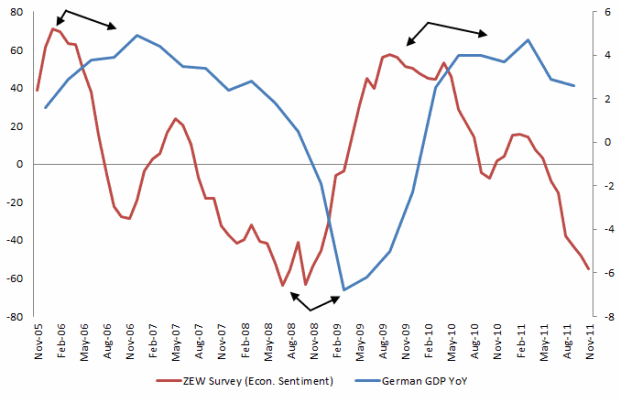Economic data out of Europe of late has raised concerns of a possible recession. In addition to much of the periphery, Eurozone, German, and French PMI have all fallen below the 50 threshold indicating contraction. Industrial production in Sept. fell -2.0% m/m which was the largest drop in nearly two and a half years. Forward looking sentiment indicators have also declined significantly with the latest being today’s release of the ZEW survey. The economic sentiment component of the German ZEW survey for November fell to 3-year lows today of -55.2 from the prior -48.3 (cons. -52.5). The data attempts to predict developments 6-months in advance and we can see in the graph below that it tends to lead GDP. The German economy is especially significant to the health of the euro zone as it is the region’s largest economy.
Growth has arguably peaked and the current downturn may soon enter recessionary levels. 3Q preliminary GDP figures released this week out of Europe showed a worsening contraction in Portugal to -1.7% y/y from the prior -1.0% and slowing growth in German with +2.6% yearly growth from the prior +2.9%. EZ 3Q GDP growth decelerated to +1.4% y/y in 3Q from prior +1.6% and France’s GDP grew only +1.6%. Last week, the European Union cut its growth forecasts for 2012 and noted that the region could face a “deep and prolonged recession”. In its semiannual forecast, the EC reduced its forecast for growth in the euro zone to 0.5% in 2012 from the previous forecast of 1.8% which was released in May. The commission cited financial turmoil, government austerity packages, weak confidence and slowdowns in external economies that trade with Europe as reasons for the bleak outlook.While growth is expected to be slightly positive next year, this does not mean that the EZ may see a brief recession. A technical recession results from two consecutive quarters of negative economic growth. Many central bankers including ECB President Draghi have stated their expectations for a European recession. At his first policy setting meeting as ECB President, Draghi noted that Europe is heading towards a ‘mild recession’. Among other things (i.e. political uncertainty, financial stresses) the threat of a recession is likely to keep pressure on the common currency. At the same time, the USD is likely to benefit as a safe haven. As such we maintain our bearish bias on EUR/USD and continue to view rallies as selling opportunities.

